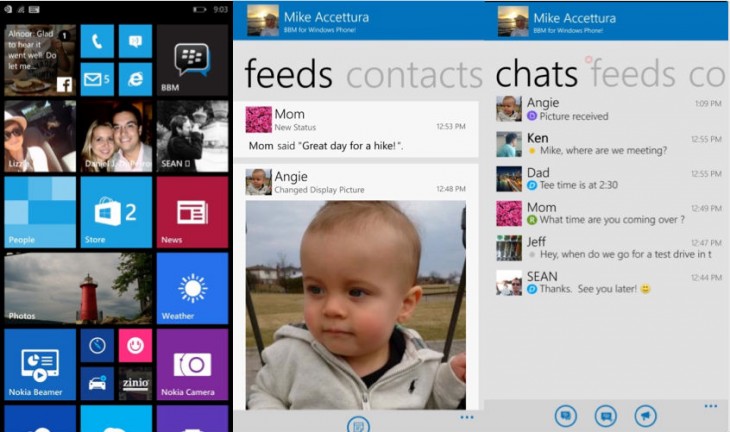You thought that BlackBerry’s messaging service landed on iOS and Android several years too late, its (late) arrival on Windows Phone takes it to the next level. BlackBerry teased the launch of its BBM messaging service on Windows Phone back in February, and now users can finally get their hands on a beta version, the company announced yesterday.
The app boasts a native experience that makes use of the Windows Phone user interface and focuses on three areas: Contacts, Chats and Feeds. Swiping left and right will move you between the three pages, while common actions are found at the bottom of the page, and additional controls can be accessed in the menu through the button with three dots.
One of the more unique features BBM for Windows Phone has is the ability to pin a contact to the Start menu for easy access — when you select that BBM contact right from the Start menu, you’ll be taken directly to a chat window with them.
Similar to other iterations of the app, users can chat with one or many BBM contacts and have the ability to share pictures, voice notes, contacts and location. However, the beta version is still lacking stickers — which BlackBerry finally introduced earlier this year – BBM Voice, BBM Channels and location sharing powered by Glympse. BlackBerry says these will be landing in the “coming months.”
There is also a feature known as BBM Groups, which not only has a private group chat, but a shared photo album where group members can chat about pictures, as well as shared calendars and shared lists.
BBM features feeds too, which lets you see when contacts update their status or profile photo (think Facebook updates in a chat app). If you want to chat with your friends about their latest updates, you just have to tap on their name to be redirected to a chat.
BlackBerry is opening up the beta version of BBM for Windows Phone so users can test it and provide feedback, but if you’re waiting for the full release, the company advises you to wait “just a bit longer.”
BBM was rolled out for iOS and Android devices in October last year, with BlackBerry saying it hit over 10 million downloads in the first 24 hours. However, the company seems to be fighting a losing battle as it joins the game so late. When iOS and Android became the dominant forces in mobile, BlackBerry didn’t speedily bring BBM over to its two competing platforms — and saw a ton of chat alternatives pop up instead.
----------
If you liked this article, please subscribe to our YouTube Channel for tech news, reviews and video tutorials. You can also find us on Twitter, Instagram and Facebook.





